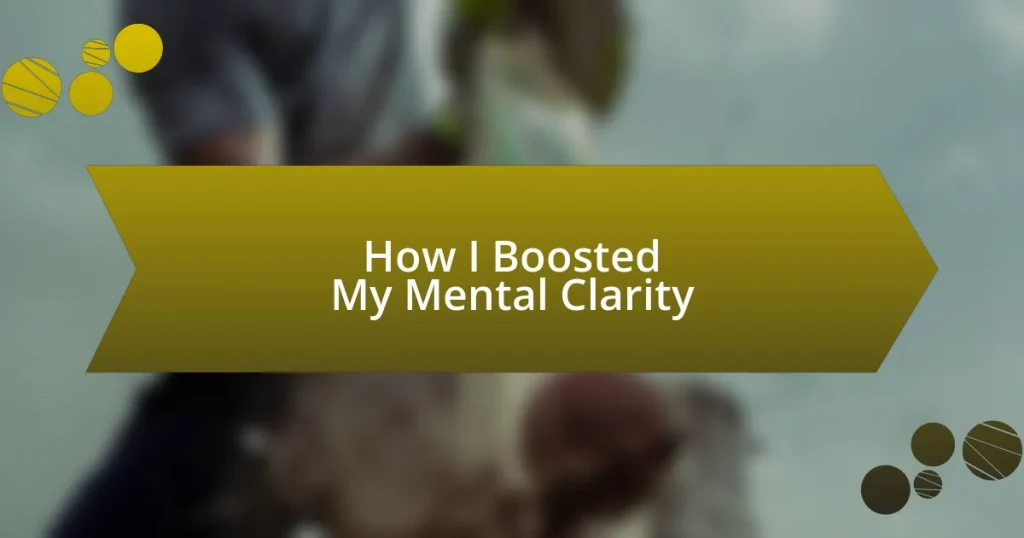Key takeaways:
- Mental clarity enhances decision-making and creativity, allowing for smoother daily experiences.
- Common blockers include stress, information overload, lack of sleep, poor nutrition, and a negative mindset.
- Practicing mindfulness and incorporating physical activity significantly improve focus and cognitive health.
- Nutrition and hydration play crucial roles in cognitive function, influencing mental clarity and productivity.
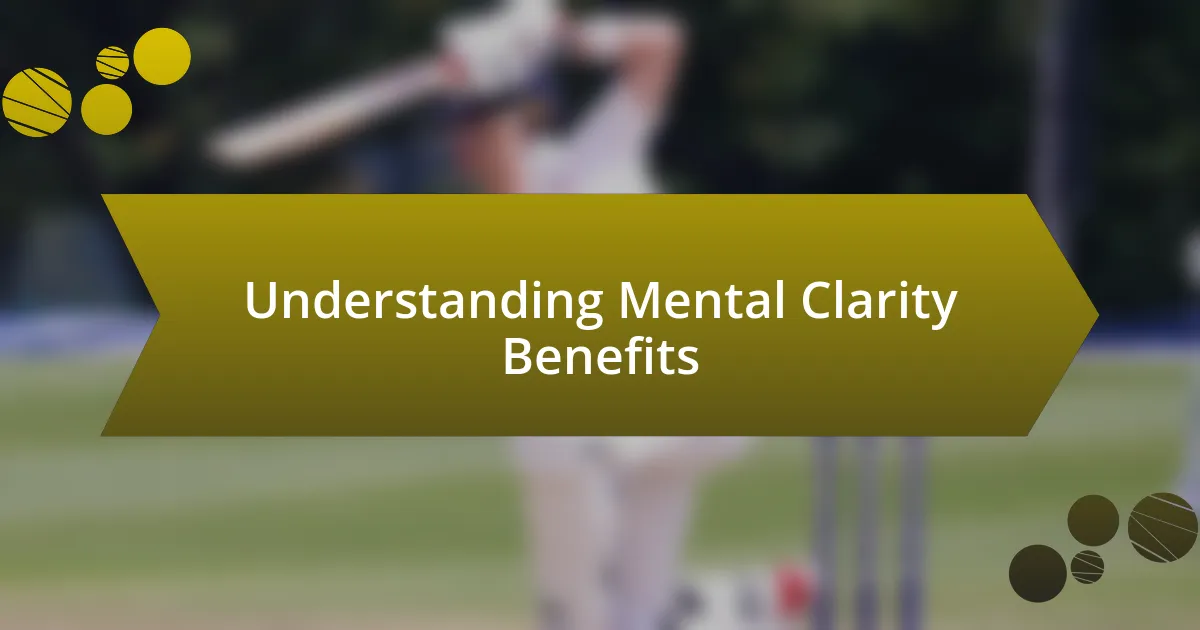
Understanding Mental Clarity Benefits
Mental clarity is a transformative state that enhances every aspect of our lives. I remember the time when I struggled to concentrate on tasks, feeling overwhelmed and lost. Once I started appreciating the benefits of mental clarity, it was like shedding a fog that had clouded my thoughts for years. Have you ever experienced that moment when everything just clicks?
Improved mental clarity leads to better decision-making. During a challenging period in my career, I found myself making hasty choices driven by panic. When I focused on clearing my mind, my choices became more deliberate and confident. Can you imagine how much smoother your life would be if decisions felt more effortless?
Besides decision-making, mental clarity boosts creativity. I often found that my best ideas flowed freely after a mental reset. I recall a particularly frustrating brainstorming session where nothing valuable emerged—until I took a short walk, allowing my mind to breathe. Have you noticed how sometimes your best thoughts come when you least expect them? Embracing those moments of clarity can unlock a well of creativity, eventually leading to innovative solutions.
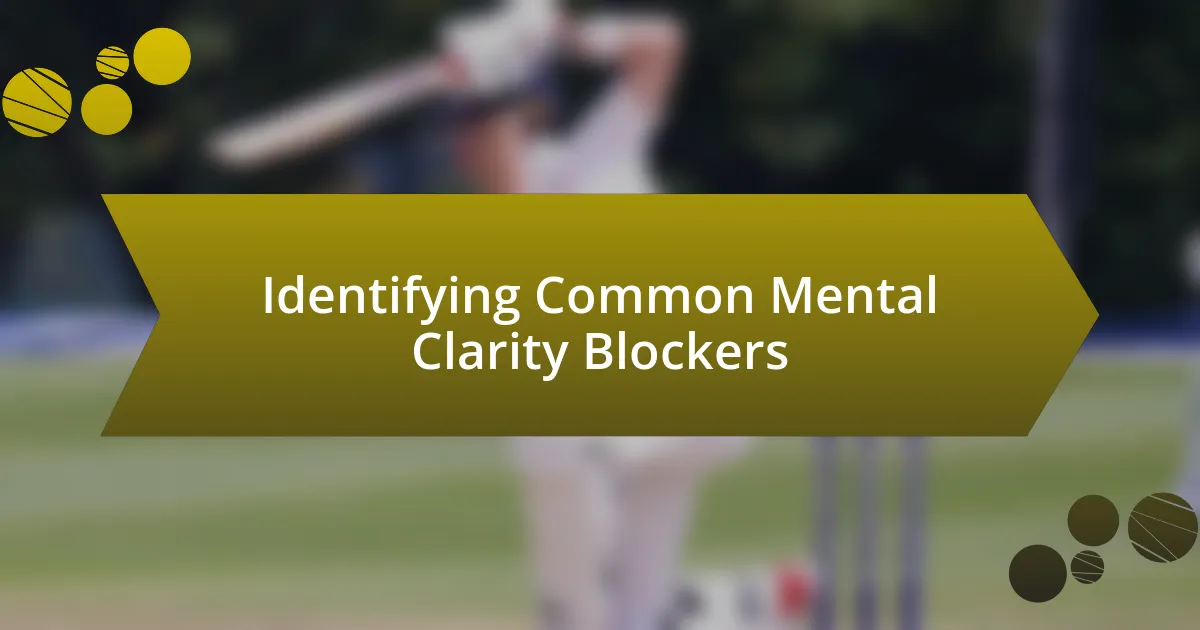
Identifying Common Mental Clarity Blockers
Identifying what stands in the way of our mental clarity can be a game-changer. For instance, I often find that stress is a sneaky blocker. There was a time when I handled stress poorly, which left me feeling mentally drained and foggy. Understanding this pattern helped me take better control of my mental state, leading to significant improvements in focus and productivity.
Here are some common mental clarity blockers:
- Stress and Anxiety: They cloud your thoughts and create a sense of overwhelm.
- Information Overload: Too many tasks or distractions can make it hard to focus.
- Lack of Sleep: Sleep deprivation impacts cognitive function and clarity.
- Poor Nutrition: A body lacking essential nutrients struggles to perform mentally.
- Negative Mindset: Pessimism can warp perception and hinder clear thinking.
Recognizing these blockers is the first step toward regaining that much-needed clarity. It’s fascinating how acknowledging these challenges can empower us to make changes, allowing for a more focused and fulfilling life.
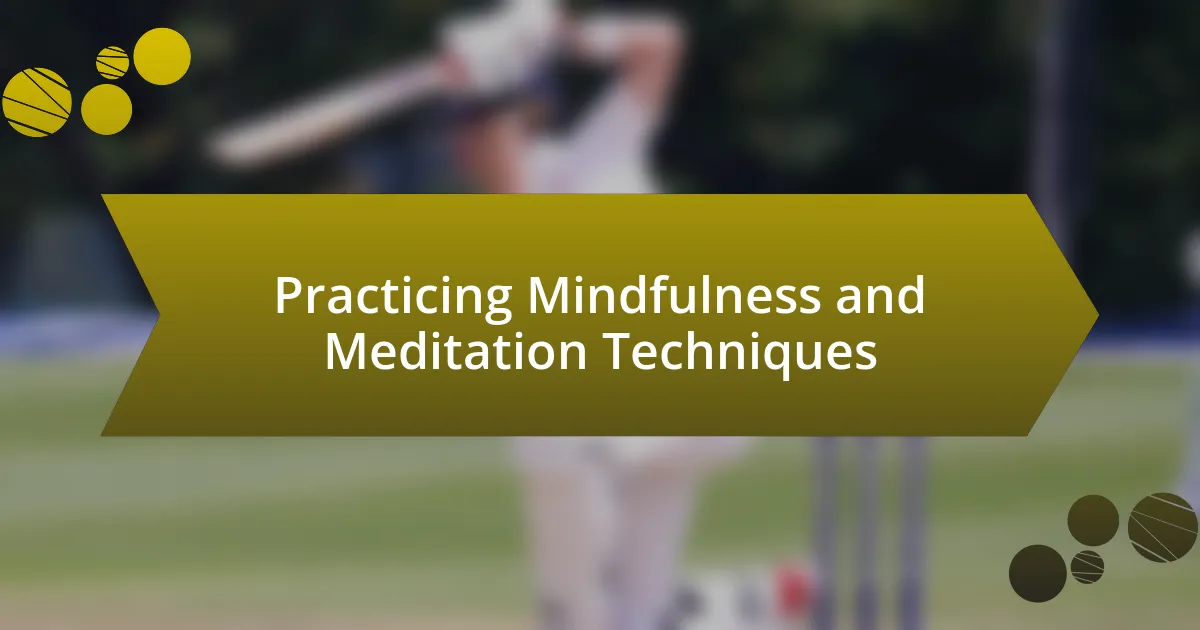
Practicing Mindfulness and Meditation Techniques
Practicing mindfulness and meditation techniques has profoundly impacted my mental clarity. Initially, I was skeptical about spending time in silence, but I soon discovered that just ten minutes of focused breathing in the morning brought a noticeable calmness to my hectic days. I remember one particularly chaotic day when a brief mindfulness session helped me reset my mindset, allowing me to dive back into work with renewed focus and clarity.
There are various meditation techniques to choose from, each offering unique benefits. Personally, I have found guided meditations, especially those centered on visualizations, to be incredibly effective in honing in on my mental clarity. It’s amazing how imagery combined with soothing sounds can transport you to a more peaceful state. On days when I’d feel overwhelmed, even a short five-minute session made a difference, allowing my thoughts to settle like dust after a storm.
Incorporating mindful practices into my daily routine has created a ripple effect on my overall mental state. I’ve noticed that being present helps reduce my tendency to ruminate over past mistakes or worry about future uncertainties. By consciously dedicating time to more intentional thinking, I can better navigate distractions and engage with my surroundings more fully.
| Meditation Technique | Benefits |
|---|---|
| Mindfulness Meditation | Enhances awareness and presence in the moment |
| Guided Visualization | Stimulates imagination and reduces stress |
| Body Scan Meditation | Promotes relaxation and bodily awareness |
| Loving-Kindness Meditation | Increases compassion towards oneself and others |
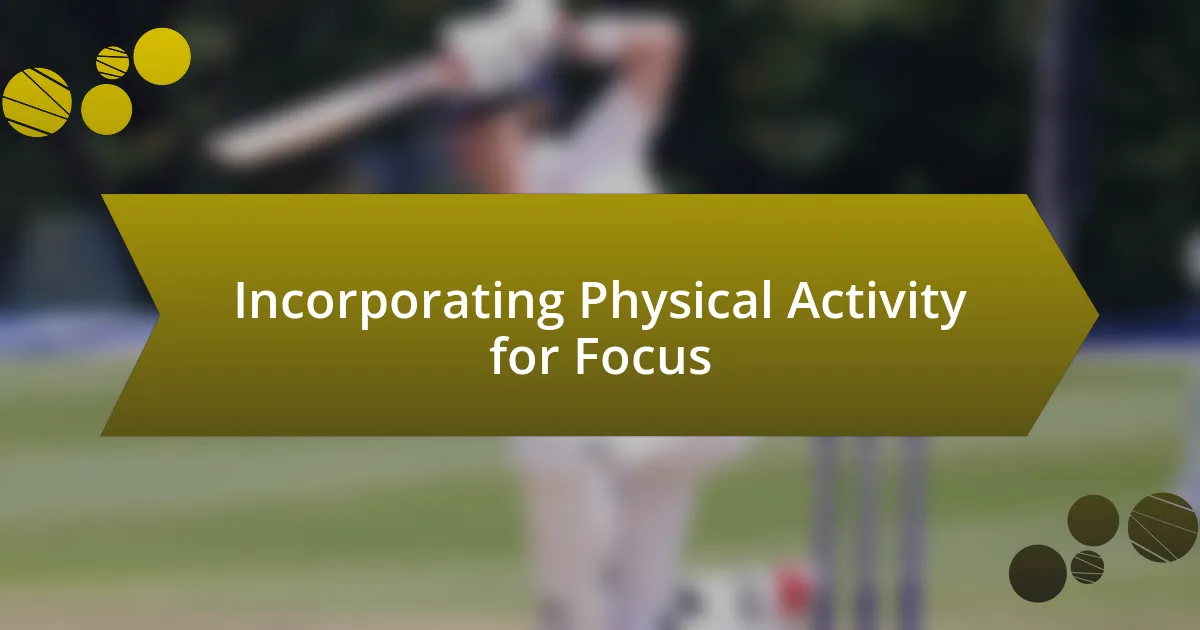
Incorporating Physical Activity for Focus
Incorporating physical activity into my routine has been a game changer for my focus. I vividly recall a time when I started my mornings with a brisk walk; it was incredible how a simple change like moving my body could clear my mind. Have you ever noticed how a quick workout can shift your entire day’s perspective? For me, breaking a sweat not only boosts endorphins but also sharpens my ability to concentrate throughout the day.
I particularly love using intervals of physical activity, like quick 10-minute burst workouts, interspersed with my work. One day, after I felt a mental fog creeping in from staring at the screen for too long, I decided to do a few jumping jacks and push-ups right in my living room. That brief action revitalized my energy and focus, allowing me to tackle tasks with fresh clarity. Each time I do this, it feels like hitting a mental refresh button.
Additionally, I’ve turned to yoga during my breaks as a way to connect movement with mindfulness. Just stretching my body while shifting my breath has repeatedly helped me feel light and clear-headed. It’s fascinating how such intentional physical engagement can synchronize both body and mind, truly enhancing the focus required for my deeper work. Have you found a physical activity that resonates with you? Discovering that rhythm can transform your approach to daily tasks!
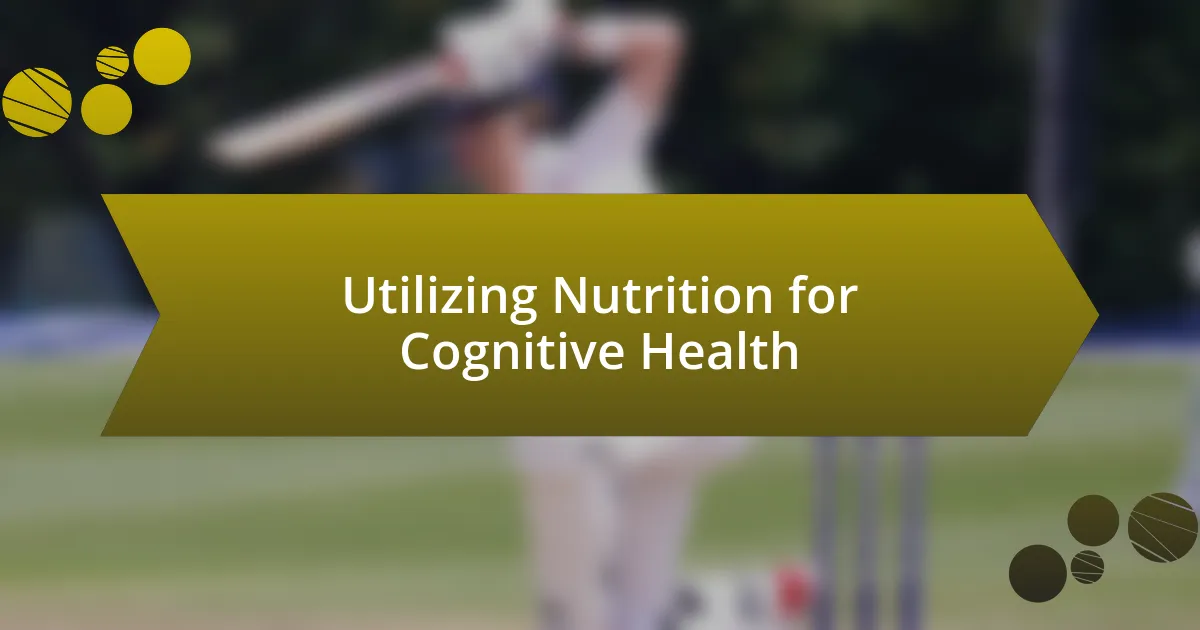
Utilizing Nutrition for Cognitive Health
Utilizing nutrition for cognitive health has played a pivotal role in enhancing my mental clarity. I remember the time I swapped my usual breakfast of sugary cereals for a hearty bowl of oatmeal topped with fresh berries and nuts. Immediately, I noticed a significant shift in my ability to think critically and creatively. Have you ever experimented with your breakfast? The right fuel can truly set the tone for your entire day.
I’ve also found great value in incorporating healthy fats into my diet, particularly omega-3 fatty acids found in fish like salmon. One day, after a particularly exhausting week, I decided to cook a delicious salmon fillet with a side of sautéed spinach and quinoa. That meal didn’t just feel good; it ignited my brainpower like nothing else. The clarity that followed allowed me to tackle my projects with newfound energy. What have you been eating lately that contributes to your mental stamina?
Furthermore, hydration cannot be overlooked when discussing cognitive health. I began tracking my water intake after realizing that even slight dehydration impacted my focus. To make it more engaging, I designed a fun water-drinking challenge for myself, setting hourly reminders to sip from my favorite water bottle. This small adjustment made a noticeable difference in how sharp I felt. Have you found ways to stay hydrated consistently? Each sip contributes to a clearer, more focused mind, and it’s a habit we can all cultivate together.
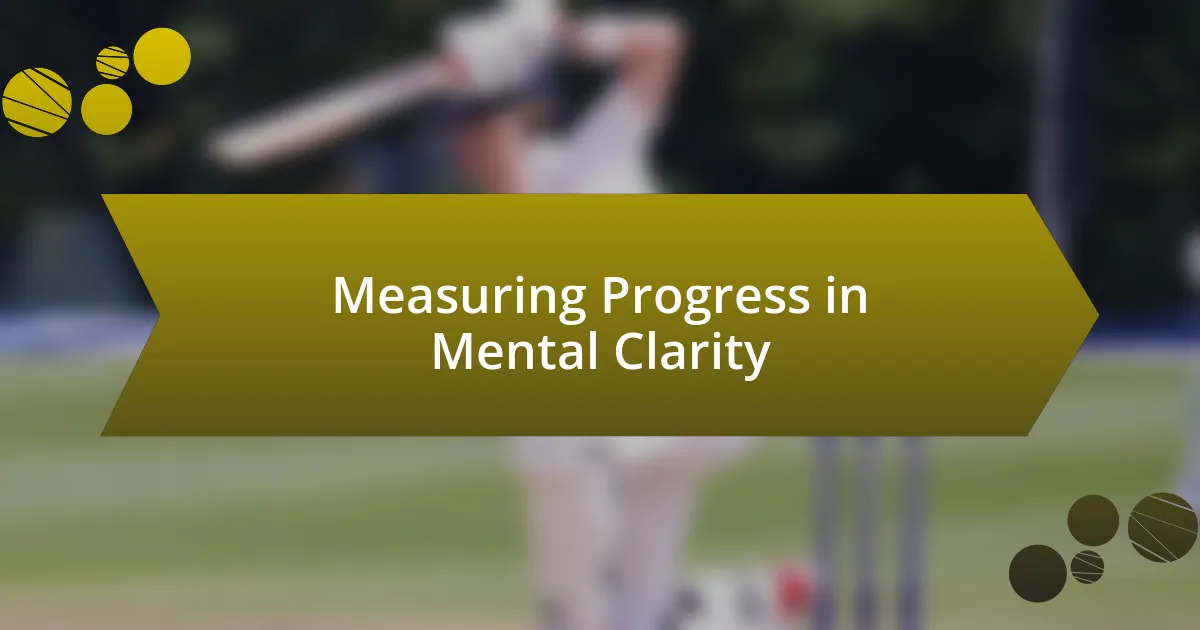
Measuring Progress in Mental Clarity
Tracking progress in mental clarity can be a game-changer. I once kept a daily journal to assess my mental state, noting how I felt each morning after my new breakfast routine. This simple act revealed patterns: on days when I followed my nutritional guidelines, I consistently felt sharper and more focused. Have you ever considered how your daily habits shape your mental landscape?
I also experimented with meditation as a tool for measuring clarity. I started with just five minutes a day, and at the end of each week, I reflected on how I processed information and approached challenges. The transformation was remarkable; I found that my ability to concentrate improved significantly. What mindfulness practices have you explored to enhance your mental agility?
Using technology to measure my mental clarity became another insightful avenue. I downloaded an app that allowed me to track my focus and productivity levels throughout the day. It was fascinating to see my energy fluctuations; those moments of sharp clarity often linked back to my commitment to nutrition and hydration. Have you ever tried using tech tools to help gauge your mental sharpness?










